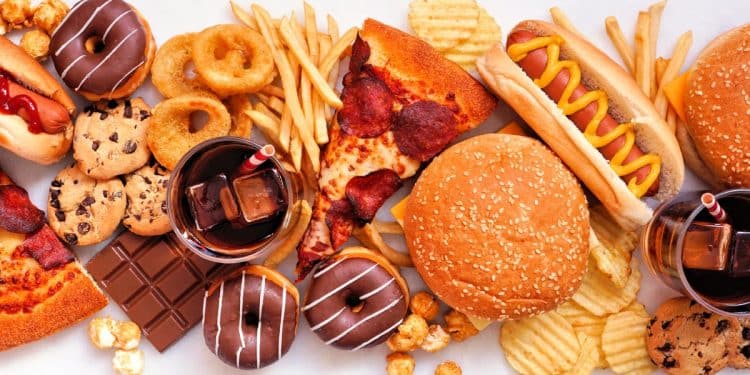Your snacks could be targeted by the new Trump administration.
Since years, the federal authorities have avoided regulating fast food, junk food and ultra-processed foods.
Now attitudes are shifting. Some members of Donald Trump’s inner-circle are preparing to fight “Big Food” or the companies who make the majority of food and drinks consumed in the United States. The nominees for the top health agencies have targeted ultra-processed food, which accounts for 70% of America’s food supply. According to recent statements, the Trump team may consider a range of politically charged options for regulating ultra-processed foods, such as warning labels, changes in agribusiness subsides, and limitations on what products consumers can purchase with government food assistance.
Right-wingers are leading the charge to reform the American Diet. This cause has been popular with the left for many years. Robert F. Kennedy Jr. and other Trump supporters, including those who are still awaiting confirmation by the Senate for his controversial nomination to head the Department of Health and Human Services, have embraced a concept which champions alternative medicine and natural foods. They’ve called it “MAHA” or Make America Health Again. They have gained momentum due to their broad bipartisan support, even in a Congress that was bitterly divided last year.
The food industry has a lot of political power and has been able to thwart previous attempts to regulate their products or marketing. According to OpenSecrets , the category “food processing companies” (which includes Nestle SA and Tyson Foods) spent $26.7 million on lobbying annually in 2024. This is up from nearly $10 million in 1998.
Laura Schmidt, professor of health policy at the University of California, San Francisco, said, “They’ve been instrumental and extremely successful in delaying any regulatory efficacy in America.” It feels like there should be a reckoning where people ask the question “Why do we live this way?”
“Ultra-processed Food” can mean different things to different individuals. It is used for items such as sodas and many frozen meals. These products contain added sugars, starches, and fats. Researchers have found that ultra-processed food consumption is associated with chronic diseases like cancer, diabetes, and mental health issues.
Leaders in nutrition and health are confident that the reckoning has already begun. Kennedy has promised to remove processed food from school lunches and restrict certain additives like dyes in cereals. He also pledged that federal subsidies would be removed from commodities crops used in ultra-processed food.
Lawyers are exploring legal options to challenge major food producers for selling products that they claim cause chronic diseases.
Bryce Martinez has filed a suit in December against a dozen food producers, including Kraft Heinz and Nestle USA. By the age of 16, he had developed non-alcoholic liver disease and diabetes. He is now seeking compensation from these companies for his illness. The suit filed at the Philadelphia Court of Common Pleas alleges that the companies knew, or should have known, that ultra-processed food was harmful and addictive.
The lawsuit notes that Martinez grew eating foods heavily advertised by brand names that are staples in the American diet. These include sugary drinks, Cheerios, Lucky Charms and Skittles, packaged and frozen dinners as well as Skittles, Snickers and Skittles.
Nestle, Coca-Cola and Kraft Heinz did not respond to emails seeking comments for this article. The Consumer Brands Association (a trade association of manufacturers of consumer packaged products) denied the allegations.
In a recent statement, Sarah Gallo said that attempting to label foods as unhealthy because they have been processed or by demonizing them for their full nutritional content misleads the consumer and increases health disparities.
There are other law firms that are looking for children and adults who feel they have been harmed after eating ultra-processed food, which increases the chances of a lawsuit.
On its website, one Indiana personal injuries firm states that “we are investigating ultra-processed food (UPF), cases.” Texas trial attorneys are also looking at possible legal actions against federal regulators who, they claim, have failed to police the ultra-processed food.
On their website, they state: “If you or a child has suffered health issues that your doctor directly linked to the consumption ultra-processed food, we want your story.”
On Capitol Hill, Sens. Bernie Sanders from Vermont is an independent. Ron Johnson of Wisconsin, a Democrat, and Cory Booker, a Democrat, are all raising the alarm about ultra-processed foods. Sanders presented legislation in 2024 which could lead to a ban on junk-food advertising to children, as well as a national campaign of education and labels on ultraprocessed food that state that the products are not recommended for children. Booker signed the bill along with Democratic Senators. Peter Welch from Vermont and John Hickenlooper from Colorado.
The Senate Committee on Health, Education, Labor and Pensions conducted a hearing in December to examine links between ultraprocessed foods and chronic diseases. FDA Commissioner Robert Califf demanded more funding for the research.
Califf, at the hearing, said that food companies are tapping into “the same neurocircuits involved in opioid addiction”.
Sanders, the man who presided at the hearing, stated that there is “growing evidence” to suggest that “these food are deliberately designed for addiction.” He also asserted ultra-processed food has led to epidemics of obesity and diabetes, as well as hundreds of billions in medical costs.
The research on food and addiction has “accumulated to a point where it has reached a critical Mass,” said Kelly Brownell. She is an emeritus Stanford professor who is also one of the editors for , a scholarly guide.
Three sides – lawyers, Congress and the incoming Trump Administration – all seeming to be interested in fighting the battle – could bring enough pressure to take on Big Food, possibly leading to better health outcomes for the U.S.
In remarks made at an event held by the Heritage Foundation in December, a conservative think-tank, Robert Redfield, who was the former director of the Centers for Disease Control and Prevention under the Trump administration, said: “It’s possible that getting rid of some highly processed food could change the percentage of Americans who are obese pretty quickly.”
The claims that Big Food manufactured and sold addictive products and harm products are similar to the allegations made against Big Tobacco prior to the landmark $26 billion settlement in 1998.
The attorneys at Morgan & Morgan who represent Martinez told KFF Health News that “These companies allegedly target children using the playbook of the tobacco industry, targeting Black and Hispanic kids, through integrated marketing with toys, games, and cartoons along with social media advertisements.”
The 148 page Martinez lawsuit against food manufacturers draws on documents made public during litigation against tobacco companies who owned some of food industry’s biggest brands.
Before they agreed to a settlement with the states, opioid manufacturers, distributors and retailers were accused of similar allegations.
The opioid epidemic led to legislation allowing greater access to life-saving drugs to treat addiction.
The Trump administration may have unique challenges in its quest to take on Big Food.
In part, funding is what hinders the FDA’s ability to enforce regulation. The FDA’s drug division is funded by industry fees. However, the division that regulates food has a budget set by Congress.
Some critics claim that the FDA moves at a glacial rate. The FDA has revoked that allowed brominated oil to be used in food. In 1970, the agency concluded that brominated vegetable oil was not widely recognized as safe.
If Kennedy is confirmed as HHS secretary, he may struggle to get support from a Republican-led Congress that champions less federal regulation and a president-elect who during his previous term served fast food in the White House. Kennedy, if confirmed as HHS Secretary, may have trouble gaining support from the Republican-led Congress who favor less federal regulation. And a President-elect that served fast food at the White House during his previous term.
The question is: Will RFK make a difference? David L. Katz is a doctor and the founder of True Health Initiative. This nonprofit organization combats misinformation about public health.
“No previous administration has done much on this front, and RFK’s link to a particularly antiregulatory administration is striking.”
The U.S. population is among the most obese in the world and has one of highest rates of chronic diseases among high-income countries. The U.S. population is among the most overweight in the world, and it has the highest number of chronic diseases among high-income nations.
There is a grassroots movement out there due to how sick we are,” said JeroldMande who was deputy undersecretary of food safety for the Department of Agriculture between 2009 and 2011. It’s because people shouldn’t get sick so young. It’s a miracle if anyone reaches the age of 18 without chronic illness. It’s remarkable.”
KFF Health News, a national newsroom, produces in-depth reporting about health issues. It is also one of KFF’s core programs, which includes health policy research and polling as well as journalism.
Social:
The new Trump administration has signaled a mission of anti-regulation. The food industry could be an exception.
Both the left and right may support a challenge to combat ultra-processed foods.







